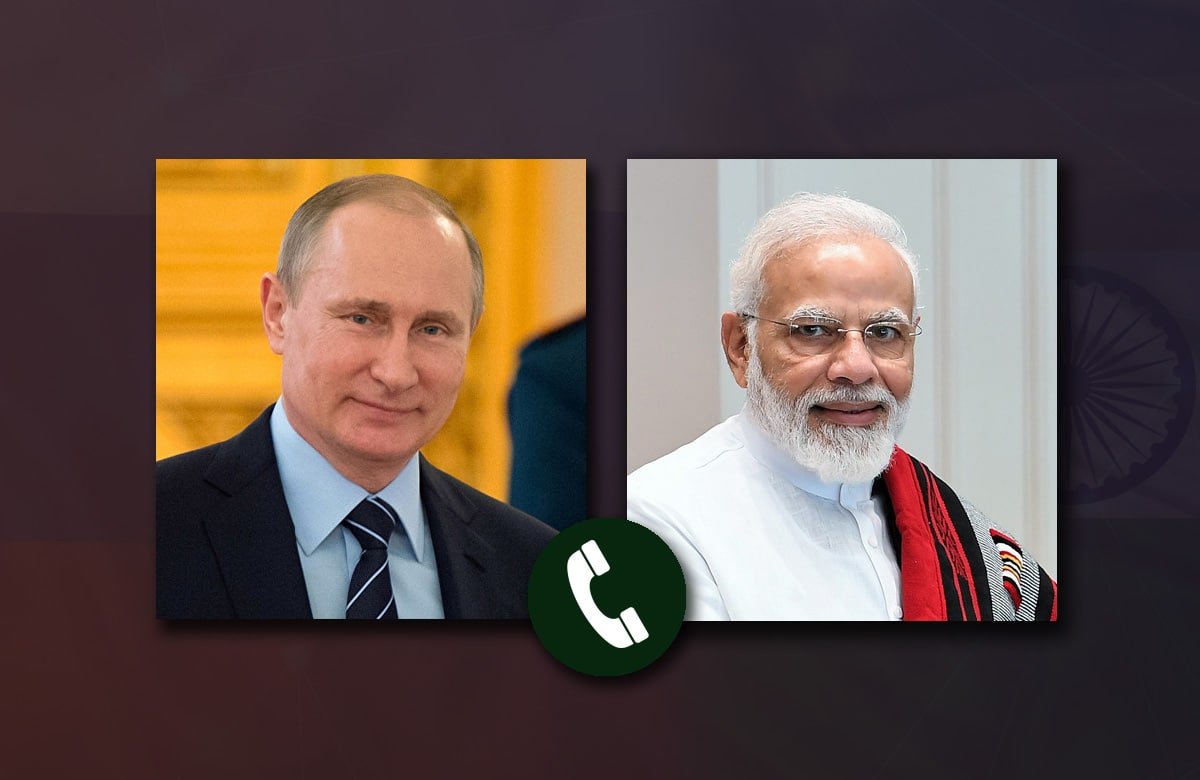Indian PM Modi, Russian Prez Putin Discuss Global Pressures; Restate Strategic Partnership
Indian Prime Minister Narendra Modi on Monday received a telephone call from Russian President Vladimir Putin, underscoring the resilience of India–Russia ties at a time of shifting geopolitical alignments and heightened economic pressure from Washington.
According to an official statement, Putin briefed Modi on his recent meeting with U.S. President Donald Trump in Alaska, where the two leaders held what Moscow described as “frank and useful” exchanges.
 |
| Image Source: MFA_Russia |
“Prime Minister underlined India’s consistent position for a peaceful resolution of the conflict through diplomacy and dialogue. He reiterated that India supports all efforts in this regard,” the Ministry of External Affairs said.
The conversation also touched on bilateral cooperation across defence, energy, and strategic affairs, with both leaders vowing to “further strengthen the Special and Privileged Strategic Partnership between India and Russia.”
They agreed to remain in close touch in the coming months, ahead of Putin’s planned visit to India later this year.
The call comes against a backdrop of intensifying global headwinds. Earlier this month, U.S. President Donald Trump doubled tariffs on Indian exports to 50%, citing New Delhi’s continued import of Russian-origin crude oil as undermining American national security interests.
India sourced roughly 44% of its crude from Russia in the second quarter of 2025, defending the purchases on grounds of price stability and strategic necessity.
The tariff escalation is the sharpest since Trump returned to office and reflects Washington’s attempt to tighten the economic screws on Moscow’s partners.
The Ministry of External Affairs in New Delhi earlier rejected the U.S. action as “unjustified and unreasonable,” pointing out that several Western economies continue their own trade with Russia despite sanctions rhetoric.
Moscow, for its part, has framed the sanctions as illegitimate. Kremlin spokesman Dmitry Peskov said earlier this month that “sovereign countries have the right to choose their own trading partners,” dismissing Washington’s moves as “economic coercion.”
The India–Russia diplomatic calendar has been dense in recent weeks. On August 7, National Security Adviser Ajit Doval met Putin in Moscow, a day after the latest U.S. tariff announcement.
Though details of their discussions were not made public, the visit was widely interpreted as signalling India’s refusal to yield to Western pressure. Doval also held talks with Russian Security Council Secretary Sergey Shoigu, with defence and energy cooperation reportedly on the agenda.
External Affairs Minister S. Jaishankar is expected to follow up with a meeting with Russian Foreign Minister Sergei Lavrov in Moscow on August 21.
Both sides have indicated that defence, hydrocarbons, and multilateral coordination through groupings such as BRICS and the Shanghai Cooperation Organisation (SCO) will dominate the agenda.
The latest call between Modi and Putin appears aimed at consolidating that momentum. It also comes as Modi prepares to travel to China later this month for the SCO summit in Tianjin, where he is expected to meet Chinese President Xi Jinping.
The timing reflects the tightrope New Delhi is walking: deepening cooperation with Moscow, managing competition and cooperation with Beijing, while weathering the fallout of Washington’s trade actions.
India and Russia have historically described their ties as a “Special and Privileged Strategic Partnership,” a designation reserved for Moscow alone. Defence procurement, civil nuclear energy, and hydrocarbons remain the pillars of the relationship, even as India has diversified its global partnerships in the past two decades.
Russia is also a key supplier of discounted crude, which has helped New Delhi cushion inflationary pressures at home.
For Moscow, India offers both a diplomatic partner that resists Western isolation and a vast market that offsets the economic impact of sanctions. For New Delhi, Russia remains indispensable in sectors ranging from defence hardware to energy security, despite growing strategic convergence with the United States in the Indo-Pacific.
Putin’s reference to his meeting with Trump in Alaska suggests Moscow is keen to keep New Delhi informed of its engagement with Washington, particularly as U.S. tariffs risk driving a wedge between India’s energy security needs and its trade prospects in the American market.
Analysts note that keeping India in the loop allows Russia to reinforce the narrative of multipolarity that Modi himself has championed in calling for a “fair, balanced, and multipolar world order.”
The coming weeks will test how far India can sustain this balancing act. Putin’s visit to India by the year’s end is expected to yield new agreements in defence, hydrocarbons, and potentially local currency trade mechanisms.
Simultaneously, India will have to navigate a turbulent global economy, tightening U.S. trade barriers, and the continuing volatility of oil markets.
